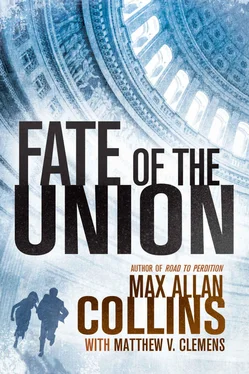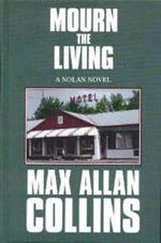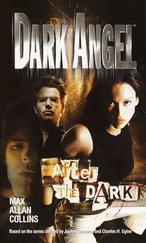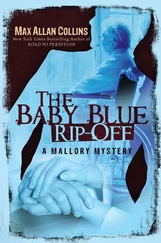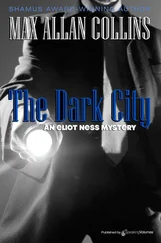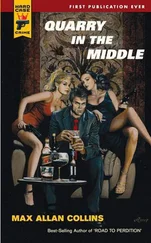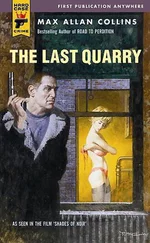Ivanek frowned at the screen. “What’s this?”
“Security footage,” Miggie said, “from the hotel the night Bryson died.”
Nichols asked, “How did we get this so fast?”
Rogers said, “When Joe told me he was looking into his friend’s suspicious death, I had Miggie get that footage for him. As a favor.”
“Do we get a better look at this guy?” Bohannon asked. “Working pretty hard to keep his face a secret.”
Miggie said, “At the very end, we do.”
A few seconds later, a hand came across the lens, then a forearm, and the picture went to snow.
Hardesy frowned. “ That’s the better look?”
“Tattoo,” Reeder said.
“ Gesundheit ,” Wade joked, but he was staring at the snowy screen.
Reeder said, “Run it back slow, Miggie.”
Rogers had seen it, too, a hint of something on the wrist where the shirt and coat sleeves tugged down as the arm reached up.
Miggie froze the image, the inked skin still half-hidden under the cuff of the shirt.
“What is it?” Wade asked.
Bohannon said, “A banner of some kind...?”
Nichols said, “Lettering, but I can’t tell...”
Hardesy stood with a suddenness that startled everybody a little. He took off his jacket, unbuttoned the cuff of his shirt, folded it back and showed his own tattoo: a sword pointed upward, two arrows crossing it diagonally, a black banner, the ends touching the tip of the blade on either side, forming a shield. Within the banner, in white, the words De Oppresso Liber .
It matched the one in the video.
“Finally we have a suspect,” Wade said. “Somebody put the bracelets on Luke here.”
A few laughed; most didn’t.
Rogers had seen that tattoo plenty of times back in her days as an MP. She said, “United States Army Special Forces.”
Hardesy nodded. “That’s the Special Forces motto — loosely translates to ‘liberate the oppressed.’”
Rogers sighed, nodded, and said, “It’s a beginning.”
Ivanek said, “It is, but not enough to tell us if our guy is current military or a mercenary.”
“Almost certainly a merc,” Reeder said in a quiet way that brought all eyes to him. “Currently serving Special Forces guys aren’t running around DC over a period of four months committing executions.”
Wade said, “Guy in the video’s blond, and so’s the guy in Bryson’s photo. Are they one and the same? Before, I thought the SIM card blond was our next possible victim. Now I’d vote for suspect.”
“If,” Reeder said, “they’re the same guy.”
Ivanek was shaking his head. “Hard to say. Video’s worse than the crappy picture.”
“I’ll take a swing at a comparison,” Miggie said to Rogers, “and get back to you.”
Rogers’s cell phone rang. She would have preferred to ignore it, but caller ID said it was Woods, the DC homicide detective.
“Shit news,” Woods said.
“What?”
“Somebody torched Bryson’s office.”
“Damnit.”
“It gets worse. The uniformed officer we left on the door last night? He went back this morning, looking for a coffee cup he left behind. Walked right in on the guy torching the place, apparently. Wasn’t expecting anything, so the arsonist got the best of him somehow.”
“When you say ‘the best of’...”
“Shot him. Execution style. Two in the back of the head.”
She sucked in breath, the news hitting her like a blow. “I’m so very sorry, Detective Woods. We’ll do everything we can for you. I’ll have agents out there ASAP.”
“Well, I appreciate that, Special Agent Rogers,” he said, his voice conveying the opposite. “But this is our case. Please keep that in mind. I’m just calling as a courtesy.”
“I do understand. You’ve lost one of your own. But we’re in this together now. You take lead on this aspect, okay?”
“Fine,” he said, in an I’ll-believe-it-when-I-see-it manner, and clicked off.
She did the same, then answered the question that every face in the room was silently asking.
“Bryson’s office has been torched,” she said.
“Good,” Reeder said.
Rogers suddenly recalled how cold he had at first seemed to her, on their case last year.
She said, hollowly, “Joe, an officer’s been killed,” and filled them in on that, leaning hard on the double-tap that made this part of their case.
“I’m sorry to hear about the officer,” Reeder said without apparent emotion. “But we’ve picked up a valuable piece of the puzzle.”
“Well, I’m glad there’s a silver lining to an officer’s death.”
He ignored that. “The killer doesn’t know that we found what he was looking for — the SIM card that gave us those photos.”
Rogers frowned. “How do you figure that?”
“Well, if he’d known, he wouldn’t have gone back there this morning. No reason to.”
Getting it, she said, “Instead he did go back, finished his search, unsuccessfully, then burned the office, so that nobody could find whatever-it-was.”
“Exactly,” Reeder said. “Remember, if what we have is a serial killer, this would go on till we catch him. People would die, but eventually the killer would lead us to him. But a pro, killing names on a list? He stops when he gets to the bottom. And then he’s gone.”
Rogers said softly, “That could be at any moment.”
“Which means,” Reeder said, slowly scanning the faces at the table, “we need to catch him fast.”
“’Tis the business of little minds to shrink, but he whose heart is firm, and whose conscience approves his conduct, will pursue his principles unto death.”
Thomas Paine
The Special Situations Task Force worked through the weekend, but their efforts produced no new leads. Plowing through security footage — from both the Skyway Farer motor hotel and various businesses in the Bryson Security strip mall — made for tedious, eye-strain-inducing work; but that had been Reeder’s assignment.
The task force boss, Patti Rogers, was doing the same shit duty herself, while Miguel Altuve had taken up a desk in the bullpen to work his computer magic (somewhat surprisingly, no goats were sacrificed). The two teams of agents — Lucas Hardesy and Anne Nichols, Jerry Bohannon and Reggie Wade — were out talking to friends, neighbors, and work associates of both Chris Bryson and DeShawn (aka Karma Sabich) Davis.
Behaviorist Trevor Ivanek had begged the day off, having worked the weekend before, and got it. With the serial killer theory pulled out from under him, Ivanek seemed to Reeder frankly a little lost.
So far, Monday morning had been taken up by another conference-room meeting where everybody reported in on what they’d found, which was the same thing: nothing. Or at least nothing that seemed to move them even one move ahead on this chessboard.
With his head in the investigation, Reeder had all but forgotten he’d agreed to join Adam Benjamin at the big “A Citizen’s State of the Union” event; and until his cell vibrated, Benjamin’s private number on caller ID, he’d lost track of how fast the speech was coming up.
Tomorrow night, in fact.
“Joe, Adam Benjamin. Sorry to interrupt if you’re working. I hoped we might chat briefly about tomorrow night.”
Benjamin, in good assume-the-sale salesman form, hadn’t asked if he was still coming.
Reeder was searching for a diplomatic way to decline an invitation he’d already accepted when the billionaire said, “Joe, your support is extremely important to me. Not to embarrass you, but you’re an American hero. Admiration for you crosses party lines, which is a perfect fit for the Common Sense Movement.”
Читать дальше
